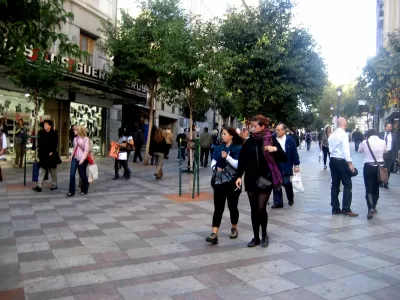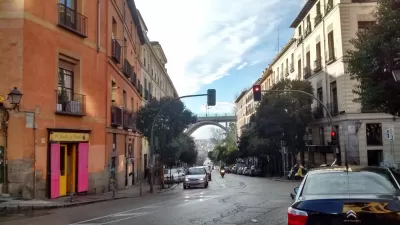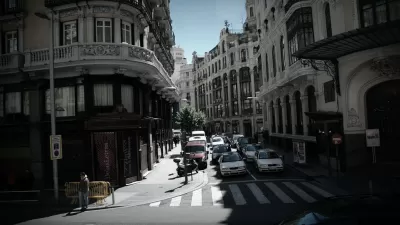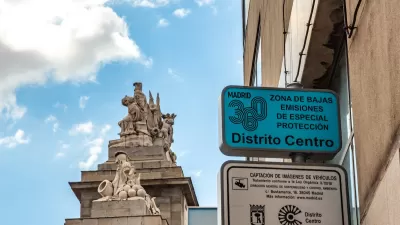In sharp contrast to France's yellow vest demonstrations against fuel tax hikes, Madrid residents took to the streets to keep them free of motor vehicles after new leaders were elected who vowed to rescind the driving ban enacted last November.

"When the city’s current center-right/right/extreme-right coalition came to power following May 26 elections, one of its first promises was to scrap the laws that had seen almost all private cars disappear from inner Madrid—not just from side streets, but from major roads, too," reports Feargus O'Sullivan for CityLab. That campaign promise has been put on hold, "and it’s likely [to] be abandoned for good."
As CityLab previously reported [via Planetizen], Madrid’s new mayor José Luis Martinez-Alameda announced that repealing the car ban was a priority. Isabel Diaz-Ayuso, the new president of the Madrid region (akin to a state governor), went so far as to declare that late-night traffic jams were part of the city’s identity.
The driving ban, with an exception for zero-emission vehicles, applies to a low-emission zone called Madrid Central. Note the emissions-based restrictions placed on motorcycles and light-duty vehicles owned by residents in the Residential Priority Area which took effect November 30, 2018, enacted by Madrid’s outgoing left-wing mayor, Manuela Carmena.
O'Sullivan reported earlier that surveys showed that driving bans were popular with the public and that the national government had plans to enact similar bans "in more than 100 other places."
With the new coalition leading city government and Mayor Martinez-Alameda taking office on June 15, public health and environmental advocates feared that the repeal would be the "first domino in a chain of anti-green backlashes that would see car bans start to collapse across Europe," adds O'Sullivan, but then the people made their displeasure known.
Thousands took to the streets at the end of June to protest the about-face—10,000 people according to the Madrid state government, 60,000 according to organizers—something that has previously never happened so soon in the term of any Madrid mayor.
Along with the march came critical coverage in the New York Times—a significant, chastening step for an administration which, regardless of who’s in power, is rarely discussed in much detail outside Spain.
Raphael Minder, the Spain and Portugal correspondent for The New York Times, noted the importance of Spain belonging to the European Union in his July 1 article as being a factor in the debate on the driving ban in the low-emissions zone known as Central Madrid.
Environmental experts now warn that the Spanish authorities could soon face a fine from Brussels [the principal seat of the EU] for not meeting stringent emissions-reducing targets laid out at the European level.
“When you look at this policy reversal over pollution in Madrid, it’s clear that there is no real green conscience in Spain,” said Lola Leirado, an activist representing Equo, the country’s main environmental party. “The only thing that saves us is that Spain is part of the European Union and environmental policy is increasingly decided in Brussels which means cities have to respect European rules — whatever their mayors believe.”
Legal as well as popular support for driving ban
In addition to public demonstrations to retain the driving ban, "two further court judgments have ruled in favor of retaining the car ban as a public health protection," adds O'Sullivan. "It’s hard to think of a municipal measure more roundly and swiftly defeated on so many fronts."
Minder, the Times correspondent, reported on a local court decision by Judge Jesús Torres Martínez that forced the new mayor to rescind his three-month order to stop fining motorists who violated the driving ban while his administration "studied other ways to combine car traffic with efforts to improve air quality."
[I]n a local court ruling issued on [July 5], less than a week after the fines stopped, Judge Jesús Torres Martínez ruled that the Madrid Central system was “essential” in order “to improve the quality of the air that the citizens of Madrid breathe, which has a direct impact on health.”
However, the measure to rescind the ban has not entirely been defeated. Martinez-Alameda is appealing the court ruling, but O'Sullivan writes it will be difficult for the mayor to succeed. "Car bans like Madrid’s offer clear, tangible improvements to citizens’ health and quality of life, and have largely gained the popular support needed to make them sustainable long-term."
Related in Planetizen:
-
Madrid’s Bold Car Ban May Become a Thing of the Past, June 24, 2019
-
Car Ban in Madrid Boosted Retail Sales, Study Shows, March 16, 2019
FULL STORY: In Madrid, a Car Ban Proves Stronger Than Partisan Politics

Alabama: Trump Terminates Settlements for Black Communities Harmed By Raw Sewage
Trump deemed the landmark civil rights agreement “illegal DEI and environmental justice policy.”

Study: Maui’s Plan to Convert Vacation Rentals to Long-Term Housing Could Cause Nearly $1 Billion Economic Loss
The plan would reduce visitor accommodation by 25% resulting in 1,900 jobs lost.

Planetizen Federal Action Tracker
A weekly monitor of how Trump’s orders and actions are impacting planners and planning in America.

Wind Energy on the Rise Despite Federal Policy Reversal
The Trump administration is revoking federal support for renewable energy, but demand for new projects continues unabated.

Passengers Flock to Caltrain After Electrification
The new electric trains are running faster and more reliably, leading to strong ridership growth on the Bay Area rail system.

Texas Churches Rally Behind ‘Yes in God’s Back Yard’ Legislation
Religious leaders want the state to reduce zoning regulations to streamline leasing church-owned land to housing developers.
Urban Design for Planners 1: Software Tools
This six-course series explores essential urban design concepts using open source software and equips planners with the tools they need to participate fully in the urban design process.
Planning for Universal Design
Learn the tools for implementing Universal Design in planning regulations.
Caltrans
Smith Gee Studio
Institute for Housing and Urban Development Studies (IHS)
City of Grandview
Harvard GSD Executive Education
Toledo-Lucas County Plan Commissions
Salt Lake City
NYU Wagner Graduate School of Public Service





























